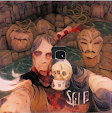A real pleasure to see my first feature, SAVAGE ISLAND, screened last night.
It's been almost a decade since we ventured into the freezing November rains to shoot our micro-epic. I'd forgotten all that we'd achieved. The movie played great. Better than I've ever seen it play, quite possibly because I was too insecure or uptight to notice what worked about it before.
When I finish a film, all I tend to be aware of are the imperfections, the places we fell short. Maybe it takes a decade to get away from all that. This time, I saw strong performances, an unstoppable story, a rich script... Sounds a little self-congratulatory, I know, but I couldn't see all that before.
You've heard of the Hero's Journey, perhaps you've heard of the Writer's Journey (a fantastic book by Chris Vogler), sometimes I like to talk about the Filmmaker's Journey.
There's a psychological journey every filmmaker goes through with their movie, I've seen it again and again when DPing or handling post or just being in contact with my indie filmmaker colleagues. I've noticed it going on within myself (but harder to see there) when working on my own movies.
It doesn't matter if you're doing a short, a documentary, a commercial, a music video, a psa, a corporate or a feature, the journey is there. You will follow it. However it does look different every time.
This is what it looks like:
(Stage of Process --> associated emotional state)
Concept --> elation. We have a great idea, we love our idea. It's the best idea ever. We're going to make a fantastic movie.
Screenwriting --> determination. We know our idea is great. We've punched out our script. It's a strong script, we're quite proud of it. This is where most indies fail by the way, at the screenplay stage. Frankly it's where most movies fail period. More about this in a later post.
Financing --> more determination, tinged with desperation. This phase can go lots of different ways, but let's talk about ultra-low budgets in particular since that's what SAVAGE ISLAND is. Generally, the money in these situations is rather easy to get. It's within the filmmaker's reach. It may be her money, it may be his parent's or some other investor's money, credit cards, a reverse mortgage. Whatever it is, it's easy to get, but you don't have enough of it. And it hurts.
Prep and Production --> excitement/terror. You're a leader, a general. You're building your team, new people joining every day. Stuff is happening. Truckloads of gear, schedules, call sheets, lists and lists. Life is full and you're in charge (this is the exciting part), you're 100% responsible for everything (this is the terrifying part). My nerves show up as stomach problems.
Post... Dailies --> joy/rage. The footage looks either absolutely amazing or totally wrong. There is no middle ground. When it looks great, you're at the top of the world. You have talent, genius, the movie is brilliant. When it doesn't, you simmer and rage. It's someone's fault, rarely yours. Mostly though, like a newborn baby, the dailies are met with wonderment and delight.
Post... Rough Cut --> depression. The assembly is generally bad news. This is the worst the movie will ever look and man does it look bad. Some people lose all hope here and give up. Movies get lost here. This is the proverbial belly of the whale. The forty years in the desert.
Post... Fine Cut --> a hero emerges. I know, I know, but that's how I think of it. Basically you go into the room to wrestle with all the problems in the assembly. You do battle with them. And you hope to emerge, a victor, having vanquished the demons before you. Really, the director's cut can be quite exciting, when you get that scene working, when you watch the sequence you're in come alive, you realize the movie may not be dead after all. It's like the classic resurrection beat.
Post... the Polish --> pride and joy. The movie just gets better and better as the color correction, the ambience and music and fx and ADR and mix and vfx and titles and stock all come in together. It's a delicious time.
The emotional journey repeats itself every time we make a movie, I see other people go through it, each in their own way. And the entire time, we're completely blind to how the movie actually plays to an audience. It's so hard to tell, we're so consumed by our emotional journey, by our familiarity with what we're building, that by the time it's done, we have no idea what we've made anymore.
And I sit in the audience, blind to what we've wrought.
Took me ten years to see why people like the movie so much.
Subscribe to:
Post Comments (Atom)

No comments:
Post a Comment